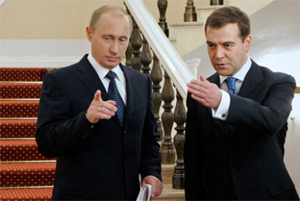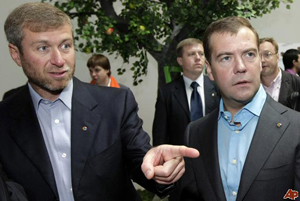Putin increases control over Russian energy
on
Putin increases control over Russian energy
Russian President Vladimir Putin has recently created a new Energy Commission by which he is seeking to wrest control over the energy sector from the government of Prime Minister Dmitry Medvedev. This move will lead to a further strengthening of the role of the State in the Russian oil and gas industry. It is bad news for those who are hoping for a more transparent investment climate, argues Alexander Gusev, Research Fellow at the German Institute for International and Security Affairs (SWP).
 |
| It is pertinent to ask who makes the decisions in the Russian energy field (c) Kennislink |
On May 7, 2012, Vladimir Putin returned as President of Russia, swapping roles with his predecessor, Dmitry Medvedev, who took over as Prime Minister. There have been many speculations about the distribution of powers between the two. Since political power in Russia is to a large extent determined by control over energy resources, any institutional changes in this sphere create a new balance of powers.
At the annual congress of United Russia, the dominant political party, in September last year, Medvedev put forward Putin as the Presidential candidate, emphasizing that it was "a deeply thought-out decision" discussed "as early as when our union was being formed." In turn Putin expressed his confidence that Medvedev would form a "new, effective, young and energetic" cabinet and "continue his work on modernizing all aspects of our lives." Despite the close personal ties between the two politicians, they do represent different camps in the Russian power structure and it is pertinent to ask who makes the decisions in the Russian energy field, keeping in mind that how the decision-making process is organized formally is different from how it works in practice.
Initially the appointment process was organized as follows: the President appointed the government (the Prime Minister and the ministers). In turn the government appointed the boards of directors of state companies (deputy prime ministers recommended representatives and they were then approved by the government).
But the process of appointments changed during Medvedev’s presidential term when his administration joined the process of appointments. While speaking at the meeting of the Commission on Modernisation in Magnitogorsk on March 30, 2011, Medvedev demanded that ministers and other officials would be excluded from the boards of directors of state companies, affecting many Russian senior officials with close relations to business structures (for example, Igor Sechin, Viktor Zubkov, Alexei Kudrin, Elvira Nabiullina, and Sergey Shmatko). In his so-called “March Theses,” Medvedev explained the need for such measures by his intention to improve the investment climate (prevented by corruption and the government’s active intervention into the economy) and consequently, to decrease the dependence of the Russian economy on energy exports.
The expert community was surprised by how fast Putin fulfilled the orders of Medvedev to remove officials from corporations. This immediately led to lively discussions in mass media speculating on various
| The expert community was surprised by how fast Putin fulfilled the orders of Medvedev to remove officials from corporations |
Money laundering
One of the most significant initiatives led by Medvedev was a trial to remove officials from the board of directors of energy companies. Through these measures, he tried to decrease government’s intervention in and influence over energy companies. Primarily, he removed people close to Igor Sechin (according to Forbes, Sechin is considered to be the most influential person in Russia after Putin). It is worth mentioning that officials were quite often members of board of directors in several companies. For example, Larisa Kalanda, Vice-President of Rosneft, left both Rosneft and Transneft and, Alexander Nekipelov, Chairman of the Board of Directors of Rosneft left only Transneft but stayed in Rosneft. For the board of directors of Rosneft, Medvedev wanted to put forward Vladimir Rashevsky, director general of SUEK and Jean-Pierre Thomas, the special representative of France in Russia, to replace Vladimir Bogdanov, head and co-owner of Surgutneftegaz and Nikolai Tokarev, head of Transneft, but these proposals were not carried out.
Changes were also made in the boards of hydropower producer RusHydro, state electricity company IDGC and federal grid company FGC UES. In addition, the Minister for Economic Development Elvira Nabiullina and Russian Energy Minister Sergei Shmatko left the Board of Directors of Gazprom. Finally, in April 2012, Sechin himself left Rosneft.
Medvedev’s initiative was supported by Putin. In November 2011, by Putin’s order, the Ministry of Energy had conducted an investigation and had found that half of the heads of the largest energy companies were involved in money laundering through offshore companies and were carrying out corruption schemes through front organizations. The then-Prime Minister stated “there are numerous cases when energy complexes of entire regions of Russia are controlled by just a family clan”.
According to a speech made by Putin at the Government’s commission on electricity, these schemes were found in several regions of the North Caucasus, Western Siberia and the Urals. He mentioned eight officials by name, who all resigned immediately.
Putin outlined several such schemes in detail: “Thus, the energy system of the North Caucasus region is largely controlled by one family – the family of Mr. Kaitov. Consumers pay for the delivered energy to the
| The income thus obtained was invested in various businesses, including the family hotel business in the city of Surgut, as well as in purchasing real estate in Russia and abroad |
However, when Putin again became President of Russia, he began to support his closest friends by appointing them to key positions. Thus, Sechin was appointed to Rosneftegaz as the chairman of the Board of Directors without consulting Medvedev. In fact, the Prime Minister was entitled to appoint members to the Board of Directors, but Putin signed this decree just before becoming President. Only one month later, Rosneftegaz was designated by Putin to become the key investor in the energy sphere. By his action Putin violated Medvedev’s decree prohibiting officials to be appointed into the boards of directors of state companies.
Medvedev and Sechin clash with each other because they favour completely different approaches to the further privatization process in energy sector. Back in 2004-2005, Sechin aspired to create a huge oil and gas monopoly in Russia, combining Gazprom and Rosneft. As the chairman at the Board of Directors of Gazprom, Medvedev actively prevented this. At present, Sechin insists on the idea to consolidate energy assets around Rosneftegaz, including Transneft and Zarubezhneft, and in the electricity sector to consolidate the assets of FSK, MRSK, Inter RAO UES and RusHydro. However, the Governmental Commission on Energy led by Medvedev resists this proposed scheme of consolidation. Medvedev has declared that the government should withdraw its participation in 12 state companies by 2016.
However, if the State were to sell its shares in Rosneft, it would lose a major advantage, as Rosneft is the only company besides Gazprom that has the special status of a strategic company with the exclusive the right to exploit offshore oil and gas reserves. All other companies, whether Russian or foreign, can have access to offshore fields only in partnership with one of these two. That´s why ExxonMobil, for example, has partnered with Rosneft to exploit the Russian Arctic areas. Hence, immediately after taking office, President Putin put limits on the government’s privatisation plans. According to Putin, the state should only withdraw participation from non-oil and gas companies. Moreover, he has decreed that if the state decides to sell the assets in the energy sector, they have to be bought by Rosneftegaz.
Open Government
The appointment of Alexander Novak as the new Minister of Energy within the new Russian government, in May 2012, led observers to believe that the Russian energy complex would henceforth be run by Medvedev and his cabinet of ministers. However, in June 2012, Putin set up a new Energy Commission (the Commission on Strategic Development of Energy and Environmental Safety), which withdrew a substantial segment of the Russian energy complex from the government’s control. It fundamentally changed the structure of economic governance in Russia.
The President appointed himself as Chairman of the new Commission and Sechin, the head of Rosneft, as executive secretary. The Commission has extensive powers. It can regulate tariffs and taxes in the sphere of energy, it can set prices for petrol, gas and electricity and decide on investment programs. Its decisions will be binding for all authorities.
Before Putin’s Commission was set up, the power to regulate tariffs and taxes had rested with Deputy Prime Minister Arkady Dvorkovich from Medvedev’s team. Putin’s move significantly reduces the government's financial means, including its ability to spend money on social programs, as oil and gas taxes constitute the key financial source for the Russian budget.
Putin’s decisions show that he puts more trust in Sechin than in Medvedev. It would have been more reasonable to set up this Commission under the Prime Minister. Traditionally, the President of Russia deals
| Putin's initiative not only shows "lack of confidence in the new government's policies", but also in the concept of Open Government |
Gontmakher also notes that Putin’s initiative not only shows “lack of confidence in the new government’s policies”, but also in the concept of Open Government (i.e. more transparency and accountability in the government). “This is now being pushed aside by a higher-level body”.
Fight over projects
The situation that has now emerged in Russia is multi-dimensional and complicated. The Russian elite is divided and there is a struggle going on for specific projects. Thus, according to a report presented recently by Minchenko Consulting Group, there are presently eight influential groups close to Putin. They fight over development projects such as "Big Moscow", the development of Siberia and of the Far East.
 |
| Roman Abramovich and Medvedev (c) sulekha.com |
The other groups are led by, among others, Igor Sechin, Sergei Ivanov and Sergei Sobyanin. The influence of different groups may be gauged by the appointment of governors, as each group tries to get their candidate appointed. This is particularly important in oil and gas producing regions.
The creation by Putin of an Energy Commission does not stand on its own. The Russian President has created several other commissions headed either by himself or by former ministers of his government. He has also appointed several former ministers, such as ex-Minister for Economic Development Nabiullina and ex-Minister of Health Tatyana Golikova, as President’s Assistants. Unlike ministers, Assistants are not accountable to anyone except the President.
What all this means is that Putin is increasing direct control over the government. In particular, it means a further strengthening of the state’s role (and the role of particular officials) in the energy sector. For the development of Russia’s oil and gas industry, this can hardly be considered good news.
| Alexander Gusev is Research Fellow at the German Institute for International and Security Affairs (SWP) and holds a German Chancellor Fellowship from the Alexander von Humboldt Foundation. |


Discussion (0 comments)